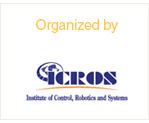The conference program will include Technical Workshops & Tutorials on
Tuesday, October 13.
The workshops and tutorials of this year will be specially interesting to those who want to learn about the latest trends and subjects.
Registration Deadline:
September 30, 2015 (Wednesday)
Download:
Tutorial_Tour_registration form.docx
※ If there are low participants, the workshop or tutorial will be cancelled.
| Tutorial |
Stability and control of Markovian Jump systems |
| Time |
10:00-17:30 (Room 201) |
| Organizer |
Prof. Hamid Reza Karimi (University of Agder) |
| Fee |
Student 150 USD, Regular 200 USD |
| Presentation |
English |
| Program |
Markovian jump systems have been widely used to describe many practical systems, such as fault-tolerant systems, communication systems, power systems, economics systems and so on. The main aim of this tutorial is to provide an introduction to the basic principles and applications of Markovian jump systems in control systems and practice. In this workshop, we will deliver highly useful knowledge and experience for graduate students, scientists, and field engineers interested in this research area.
The workshop will begin with an introduction to the state-of-the-art of Markovian jump systems and present main challenges and more recent developments and progresses in this context. Then, conventional stability analysis of these systems will be presented with some discussions on more complex Markovin jump systems including singular and time delay systems. In the sequel, control synthesis in the form of state feedback and output feedback controllers are presented for Markovian jump systems and some recent developments are presented and discussed. Then, the concepts of synchronization, model approximation and observer-based controllers for these systems are presented in details. Finally, some practical examples will be presented to demonstrate the use of Markovian jump systems in practice.
- 10:00 - 11:00 an overview of Markovian jump systems and their properties
- 11:00 - 12:00 stability analysis of Markovian jump systems
- 12:00 - 13:00 Lunch
- 13:00 - 14:00 control design for Markovian jump systems
- 14:00-15:00 synchronization and model approximation for Markovian jump systems
- 15:00 - 15:30 coffee break
- 15:30 - 16:30 observer-based control design for Markovian jump systems
- 16:30 - 17:30 case studies on control of Markovian jump systems
|
 Workshop & TutorialICCAS2015 > Program > Workshop & Tutorial
Workshop & TutorialICCAS2015 > Program > Workshop & Tutorial











